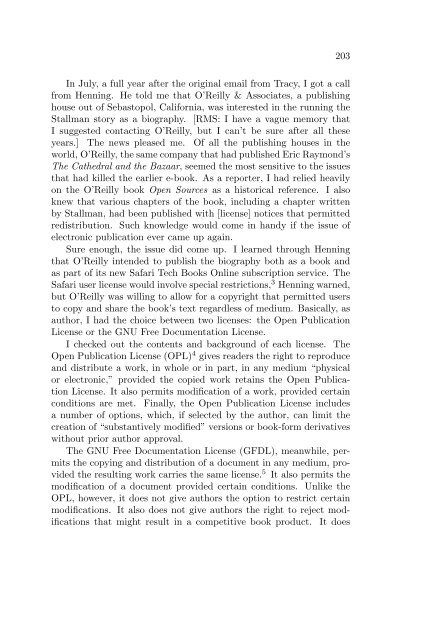Create successful ePaper yourself
Turn your PDF publications into a flip-book with our unique Google optimized e-Paper software.
203<br />
In July, a full year after the original email from Tracy, I got a call<br />
from Henning. He told me that O’Reilly & Associates, a publishing<br />
house out of Sebastopol, California, was interested in the running the<br />
Stallman story as a biography. [RMS: I have a vague memory that<br />
I suggested contacting O’Reilly, but I can’t be sure after all these<br />
years.] The news pleased me. Of all the publishing houses in the<br />
world, O’Reilly, the same company that had published Eric Raymond’s<br />
The Cathedral and the Bazaar, seemed the most sensitive to the issues<br />
that had killed the earlier e-book. As a reporter, I had relied heavily<br />
on the O’Reilly book Open Sources as a historical reference. I also<br />
knew that various chapters of the book, including a chapter written<br />
by Stallman, had been published with [license] notices that permitted<br />
redistribution. Such knowledge would come in handy if the issue of<br />
electronic publication ever came up again.<br />
Sure enough, the issue did come up. I learned through Henning<br />
that O’Reilly intended to publish the biography both as a book and<br />
as part of its new Safari Tech Books Online subscription service. The<br />
Safari user license would involve special restrictions, 3 Henning warned,<br />
but O’Reilly was willing to allow for a copyright that permitted users<br />
to copy and share the book’s text regardless of medium. Basically, as<br />
author, I had the choice between two licenses: the Open Publication<br />
License or the GNU Free Documentation License.<br />
I checked out the contents and background of each license. The<br />
Open Publication License (OPL) 4 gives readers the right to reproduce<br />
and distribute a work, in whole or in part, in any medium “physical<br />
or electronic,” provided the copied work retains the Open Publication<br />
License. It also permits modification of a work, provided certain<br />
conditions are met. Finally, the Open Publication License includes<br />
a number of options, which, if selected by the author, can limit the<br />
creation of “substantively modified” versions or book-form derivatives<br />
without prior author approval.<br />
The GNU Free Documentation License (GFDL), meanwhile, permits<br />
the copying and distribution of a document in any medium, provided<br />
the resulting work carries the same license. 5 It also permits the<br />
modification of a document provided certain conditions. Unlike the<br />
OPL, however, it does not give authors the option to restrict certain<br />
modifications. It also does not give authors the right to reject modifications<br />
that might result in a competitive book product. It does


